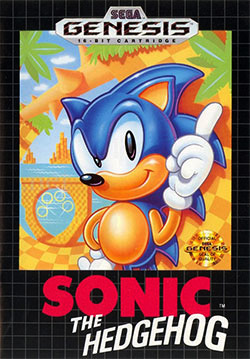Sonic the Hedgehog (1991 video game)
| Sonic the Hedgehog | |
|---|---|

North American box art
|
|
| Developer(s) | Sonic Team |
| Publisher(s) | Sega |
| Designer(s) | Hirokazu Yasuhara |
| Programmer(s) | Yuji Naka |
| Artist(s) |
|
| Composer(s) | Masato Nakamura |
| Series | Sonic the Hedgehog |
| Platform(s) | Sega Genesis, Game Boy Advance, Nintendo 3DS, iOS, Android |
| Release date(s) | |
| Genre(s) | Platform |
| Mode(s) | Single-player |
| Aggregate score | |
|---|---|
| Aggregator | Score |
| GameRankings | 86% |
| Review scores | |
| Publication | Score |
| CVG | 94% |
| Dragon | |
| EGM | 36/40 |
| Eurogamer | 9/10 (X360) |
| GamePro | 5/5 |
| GameSpot | 7.3/10 |
| IGN | 8/10 (Wii) |
| Mean Machines | 92% |
| Awards | |
|---|---|
| Publication | Award |
| Golden Joystick Award | Overall Game of the Year |
| Electronic Gaming Monthly | Game of the Year |
Sonic the Hedgehog is a platform video game developed by Sonic Team and published by Sega for the Sega Genesis console. The game was first released in North America, Europe, New Zealand and Australia in June 1991, and in Japan the following month. The game features an anthropomorphic hedgehog named Sonic in a quest to defeat Dr. Eggman, a scientist who has imprisoned animals in robots and stolen the magical Chaos Emeralds. Sonic the Hedgehog's gameplay involves collecting rings as a form of health and a simple control scheme, with jumping and attacking controlled by a single button.
The game's development began in 1990, when Sega ordered its AM8 development team to create a game featuring a mascot for the company. After considering a number of suggestions, the developers decided on a blue hedgehog with spikes along his head and spine and renamed themselves "Sonic Team" to match their character. Sonic the Hedgehog, designed for fast gameplay, was influenced by the games of Super Mario series creator, Shigeru Miyamoto. Sonic the Hedgehog uses a novel technique that allows Sonic's sprite to roll along curved scenery, which originated in a tech demo created by the game's programmer, Yuji Naka.
The game was well received by critics, with praise given to its visuals, music, and gameplay. The game was also commercially successful, establishing the Genesis as a key player in the 16-bit era and allowing it to compete with Nintendo and their Super Nintendo Entertainment System console. The game has been ported a number of times, and inspired several clones, a successful franchise, and adaptations into other media.
...
Wikipedia
